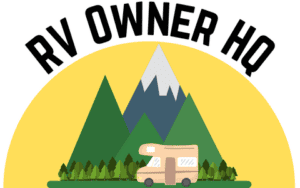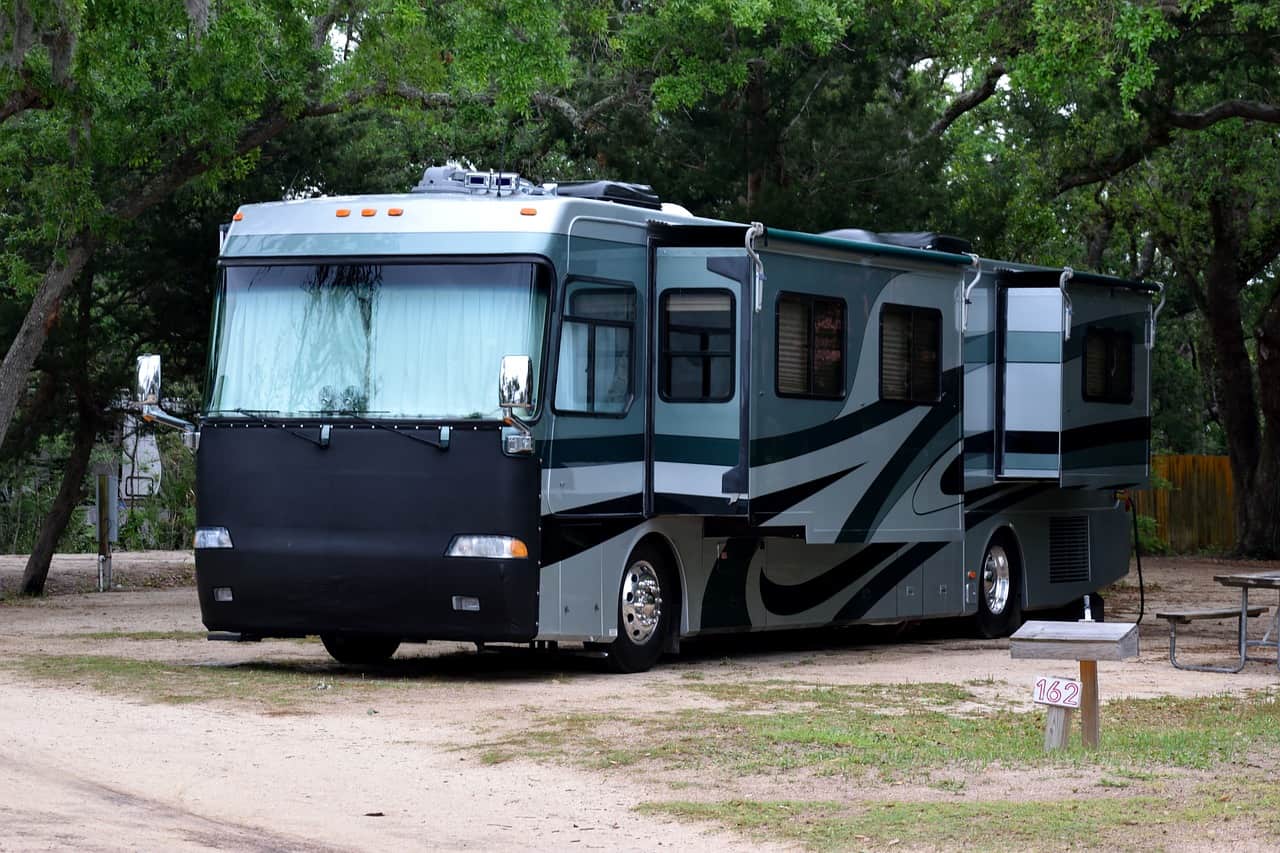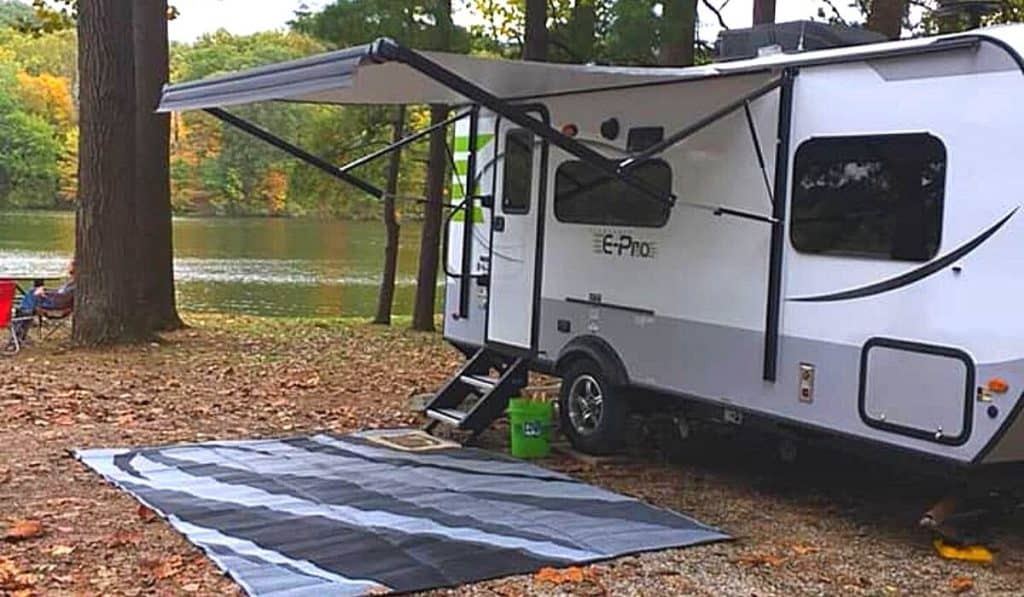There are over 1 million Americans living full-time in RVs today.
And full-time RV living is becoming more and more popular every day, as more Americans than ever are ditching the big house and endless responsibilities for a smaller life full of adventure and experiences.
But if you’re thinking about living in an RV full-time it’s hard to know where to get started.
So we created this complete guide that tells you everything you need to know about how to live in an RV full-time.
What to Do Before Moving into an RV Full-Time
There are many things you need to do early on when preparing to live in an RV full-time and most of them can be done even if you don’t own an RV yet.
Decide How You Want to RV Full-Time
While you might think there’s just one way to RV full-time, in reality, there are several different ways to full-time RV.
So while you’re in the planning and prepping stage, it’s a good idea to think about what type of RVing you want to do, as this can have a big impact on not only how you RV but also the type of RV you choose.
There are five main types of RV lifestyles including the adventure seeker, the nature lover, the hobbyist, the stay and relaxer, and the warm weather seeker.
Different Types of Full-Time RVers
- Adventure Seeker – The adventure seeker is an RVer that is always on the move looking for their next big adventure. For these RVers, it’s all about the experiences, and because they are constantly on the move a small and compact travel trailer or Class B RV will be best suited to their RV lifestyle.
- Nature Lover – RV nature lovers want to spend as much time as possible in and surrounded by nature. And will usually spend most of their time in National Parks, forestry land, and BLM land. Because of this, these RVer should look for smaller RVs capable of boondocking due to the size limits in most National Parks, and the lack of RV hookups on most public lands.
- The Hobbyist – The hobbyist is an RVer that spends the majority of their time doing and focused on a particular hobby or activity such as mountain biking, climbing, or hiking.
- Stay and Relaxer – This type of RVer is far more stationary than most other types of RVers. For them, it’s not about endless adventure seeking but about being able to slow down and enjoy life more with fewer responsibilities. Larger and more luxurious RVs are best suited for this type of RV lifestyle such as Class A motorhomes as well as fifth wheels.
- Warm Weather Seeker – Another very popular type of RVer is the warm weather seeker that is often called a snowbird. This type of RVer is constantly searching for warm weather and sun and will typically move to the southern portion of the US during the winter months.
Try a Few Trial Runs Before Transition to Full-Time RV Living
A great thing to do before moving into an RV full-time is to try a few trial runs before the big move, so you have a better idea of what to expect.
If you already own an RV these trial runs are pretty easy to accomplish, as you just need to live in your RV full-time for a week or even a month or more parked in your driveway or near your house to see what full-time RV living is really like.
For those that don’t own an RV yet, you can accomplish these trial runs by renting an RV for a week or more on a site like RVshare or Outdoorsy, to get a better feel for full-time RV living.
And if you find yourself continually wanting or needing to retreat back to your home during these trial runs, this might be a sign that you’re not quite ready for full-time RV living or that it might not be the right fit for you at all.
Which is a much better thing to find out early on, as opposed to farther down the road, when you’ve already made several big changes to your life.
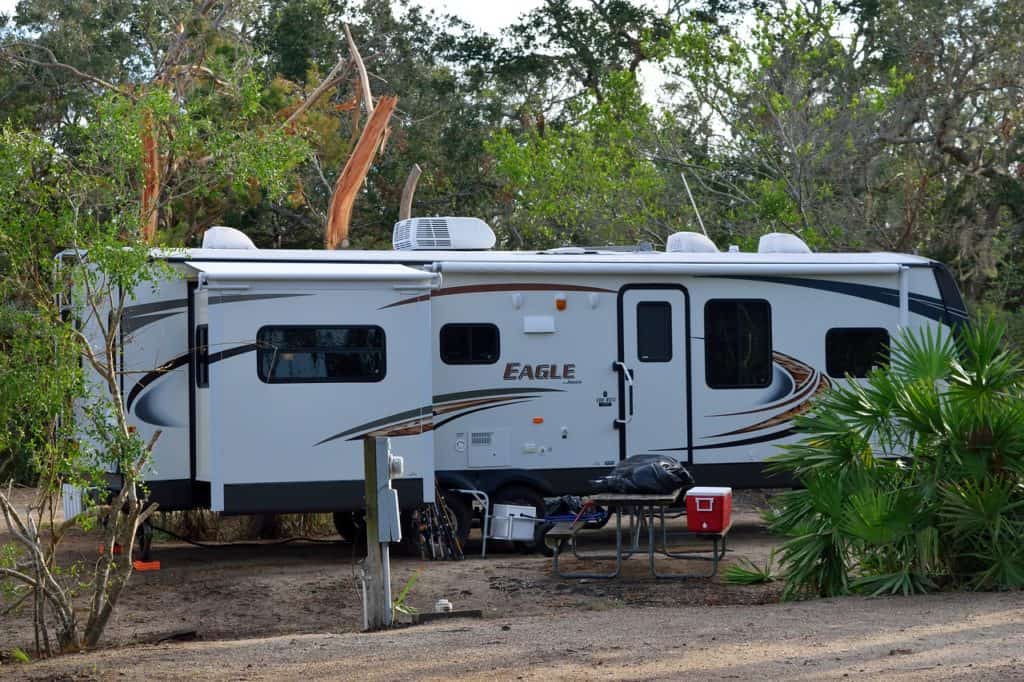
Downsize, Downsize, Downsize
Probably the most important thing to do before moving into an RV full-time is downsizing your life as well as your positions to fit into 250 square feet or less.
Did you know that the average American home has 300,000 items in it?
So a good portion of your prep time before you move into an RV needs to be spent figuring out what to do with all the stuff you have accumulated over a lifetime of buying and consuming.
This doesn’t mean however you need to get rid of everything you own, nor does it mean you have to part with the things you love.
It just means you need to prioritize your possessions and keep only the things you truly love or need.
Also, remember Rome wasn’t conquered in a day, and this is not something you need to conquer in a day either. Instead, be patient with yourself and give yourself plenty of time to sort through a lifetime of possessions and things.
Buy Used
If you don’t already own an RV, it’s a good idea to buy a used RV first as this will provide a lot more flexibility down the road.
Because no matter how much preparation and planning you do, until you actually get out on the road and experience full-time RV living for yourself, it’s hard to know exactly what type of RV is best for you and your family.
And by buying used you will be in a much better position financially to change the size or type of RV your living in because you won’t have to absorb the huge depreciation hit that is common with new RVs.
For even more reasons on why it’s better to buy a used RV over a new one, check out our article “14 Reasons to Buy a Used RV Over a New One“.
Handling Mail and Packages While Living in an RV
In today’s modern world letters and mail are becoming less and less important.
But for those letters and packages, we do need, it’s important to know how to handle them when living full-time in an RV.
The first thing to realize is that most of the mail you receive on a day-to-day basis you don’t really need in the first place. Especially considering that half your mailbox these days is probably filled with junk mail.
The next thing to realize is that by transitioning to full-time RV living, you will automatically eliminate several pieces of mail, as you will no longer receive utility bills.
Once you’ve realized these two things, then you just need to focus on eliminating as much mail as possible.
This is pretty easy to do in today’s world, as most companies and banks will gladly send your bills or bank statements to your email as opposed to your mailbox.
And for the last bit of mail you can’t eliminate, you can either have it sent to a family member or close friend and pick it up whenever you happen to be in town or use an RV club such as Escapee that will provide a permanent mailing address to you and then send your mail to where ever you happen to be at the time for a monthly fee of around $10.
The last big hurdle is packages that you might need to receive while traveling full-time in an RV but this too is not that big of a deal, as most RV parks you stay in will allow you to ship packages to the RV park or even directly to your campsite.
How to Prepare an RV for Full-Time Living
There is a big difference in how you prepare an RV for full-time living and how you prepare an RV for a weekend getaway.
So to help get your RV ready for full-time living we have included the three most important things to take care of.
Have an Organizational Plan and Get Organized
Organization is far more important when you’re living full-time in an RV, as you will be packing and storing far more things throughout the RV.
So it’s important to have a good organizational plan for both the inside as well as outside of the RV so you can find things when you need them.
Have Your RV Fully Inspected and Serviced
While there’s no way to eliminate or prevent things from breaking on an RV as this is just part of RV life.
It’s a good idea to get your RV fully inspected and serviced before you start your full-time RV journey, as this will usually help to reduce the number of issues and problems you encounter while on the road.
Not to mention that it’s much easier to have an RV worked on and repaired when it’s empty and you’re not living in it.
Don’t Buy Everything All at Once
For most people planning to live in an RV full-time, their first inclination is to run out and buy everything they think they could possibly need.
Unfortunately, this often leads to overbuying and a really packed RV, as most full-time RVers figure out in time they needed a lot less stuff than they initially thought they did.
So instead of running out and buying a bunch of stuff for full-time living. In the beginning, focus on the basics, then once you’ve lived in the RV for a while and figured out what you really need, you can buy those additional items.
Working While Living in an RV Full-Time
For most of us living in an RV also means we need to find a way to work from an RV.
But luckily with high-speed internet and wider acceptance of mobile work as well as the nomadic lifestyle, this has never been easier.
Working from an RV or while traveling really falls into two main buckets including short-term gig work or internet-based remote work. And which one you choose depends largely on your skill set as well as what type of work you like to do.
Before you start looking for a new place to work though, make sure to check with your current employer first, to see if they would be willing to let you work remotely.
Short-Term Gig Work
Short-term gig work is the easiest type of work to find while living in an RV.
While the pay isn’t always that great, usually the hours are very flexible and it’s easy to start and stop.
Some of the best places to find short-term gig work while living in an RV include:
- Snagajob – Best for Finding Part-Time Hourly Work
- UpWork – Great Place to Find Freelance Work
- CoolWorks – Best Place to Find Seasonal Jobs
- Craigslist – Great Place to Find Local Work
Remote Work
While it might be a little more challenging to find and get hired on for remote work, this is often the best option if you’re looking for more permanent and stable work with higher pay.
Again one of the best places to start, if your looking for professional remote work is your current employer, as you would be surprised at how many companies are willing to consider this at least for a trial basis.
But if it’s not possible to turn your current job into a remote job, these sites are a great place to get started.
- Indeed – Best Overal Job Site With a Wide Variety of Jobs and Work
- FlexJobs – Best Remote Work Site (Does Require a Paid Membership)
- WeWorkRemotely – Best Free Remote Work Site
- RemoteOK – Number One Site for Digital Nomads
Full-Time RV Living and Money
Money and cost are usually the two biggest concerns for most RVers wanting to go full time.
So we have tried to answer every conceivable question you could possibly have about money and cost related to full-time RV living.
https://youtu.be/EaxisePRepM
How Much Money Do You Need to Full-Time RV?
When trying to figure out how much money you need to full-time RV it’s important to write out a personal budget.
As there is often a lot of variation in monthly costs between one full-time RVer and the next, based on a number of factors including their RV lifestyle.
And to help you get started on your monthly budget, we have included a list of typical RV expenses that almost every RV budget should have.
Typical Monthly RV Expenses
- RV Financing Cost – This one can vary greatly depending on how much you spent on your RV as well as how much you financed.
- Campground Fees – This is another one that can vary a lot, as some full-time RVers choose to stay exclusively in RV parks, while other full-timers rarely stay in RV parks and instead choose to boondock or camp for free on National Forest land or BLM land.
- Fuel / Propane Costs – The amount of traveling you do as well as the type of RV you have, will have a great impact on your fuel costs.
- RV Service and Repair Costs – One item that most people leave off their RV budget are the service and repair costs of the RV, which usually runs anywhere from $500 to $1,000 a year.
- RV Insurance – Full-time RV insurance will usually cost around $1,500 a year.
- Health Insurance – Your health insurance costs should stay about the same unless you have to change jobs or change the type of work you do while RV living.
- Groceries – Plan to spend about as much on groceries as you do now, plus or minus a hundred bucks.
- Entertainment / Dining Out – This is another budget expense that can vary greatly, as some full-time RVers spend a ton on entertainment and dining out, while others opt for more free activities and eating at home.
- Cell Phone / Internet – While your cell phone bill should stay pretty much the same if you want high-speed internet, expect the cost to double or even triple compared to what you’re currently paying for home internet.
- RV Club or Camping Memberships – While RV clubs and memberships are not absolutely necessary, they tend to make life easier while on the road and can even save you money.
Is Living in an RV Cheaper Than a House?
While you might think living in an RV would always be cheaper compared to living in a house, in reality, this is not always the case and depends largely on the type of lifestyle you lead while RVing.
Because while you can eliminate some bill bills living in an RV such as mortgage payments, rent payments, and utility bills.
There are often new bills that will take their places such as RV parking and fuel costs, that can cost you just as much if not more.
What is the Average Monthly Cost to Live in an RV?
Most full-time RVers will usually spend between $2,000 and $2,500 a month while living full-time in an RV.
However, this number can vary greatly depending on a number of factors as some RVers spend less than $1,000 a month, while other RVers spend more than $5,000 a month.
How to Live in an RV for Free?
While it would be challenging to live in an RV completely free, there are things you can do that will save you a ton of money and allow you to live in an RV mostly free.
In fact, two of my favorite nomads as well as YouTubers Elsa Rhae and Barron have found a way to consistently live on only $500 a month while living in an RV, when you take out the cost of their groceries.
Top Ways to Live as Cheaply as Possible While RVing
- Avoid RV Parks and Boondock Instead– The number one way to save money while RVing is to avoid RV parks and boondock instead by staying on National Forest or BLM land that is completely free.
- Work Camping – If boondocking doesn’t sound like something you want to do, you can also try work camping which will allow you to stay in an RV park at a discount or nearly free for working part-time at the campground.
- Buy a Used RV with Cash – Another big monthly cost for most RVers is the financing cost of their new rig, so if your looking to RV for free, consider buying an older RV in good condition that you can pay cash for.
- Use Solar Power – Once you get past the initial cost of a solar setup you can, in essence, produce free electricity for all your electrical needs while RVing.
- Find Free Places to Fill Up on Water – There are many places you can find free water including gas stations and rest stops, you just need to seek permission first.
How do you Finance an RV?
RV financing can either be done through a bank or at an RV dealership.
However, usually, an RV is financed at an RV dealer through a bank or a lender the RV dealer has a relationship with.
While RV loans do differ from loan to loan, below are typical industry standards for RV loans.
Typical RV Financing
| Common RV Loan Terms | 10,15, or 20 Years |
| RV Interest Rates | 4% to 18% |
| Good RV Interest Rates | 4% to 4.5% |
| RV Down Payment | At Least 10% Preferably 20% |
| Minimum Credit Score | 660 |
| Max RV Age for Standard Financing | 10 to 15 Years Old |
Is It Safe to Live in an RV Full-Time?
While things can always potentially go wrong, in general, full-time RV living is pretty safe and typically not any more dangerous than living in a more traditional home.
However, there are some potential dangers that you should be aware of as well as some precautions you can take to help ensure you and your family stay safe while living in an RV full-time.
Full-Time RV Safety Tips
- Trust Your Gut – While most places are generally safe, some areas are not. So if your gut is telling you this area doesn’t feel right or that it might not be safe, listen to your gut and find a new place to visit or park.
- Be Aware of Your Surroundings – Often the difference between being a victim of a crime or not, depends on your level of awareness of what going on around you, so always be aware of your surroundings.
- Know Where to Find Help – When living in an RV full-time, you can often be in remote areas. So when you get to a new area take a few minutes to find out where the local emergency services are and how to get in touch with them.
- Watch Out for Bad Weather – When living in an RV, bad weather is a bigger deal, so make sure you always keep an eye on the weather and take appropriate actions if the weather turns bad.
- Consider Adding Extra Security to the RV – Because an RV is much smaller than a traditional home, it typically does’nt cost much to add a security system or extra security to the RV.
- Make Sure All Detectors are Working – Be sure to periodically check your smoke detector and carbon monoxide detectors to make sure they are in property working order.
- Be Cautious of Wildlife – While wildlife can be beautiful, it’s important to remember they are wild animals and can be unpredictable, so it’s best to keep your distance and take appropriate precautions.
For even more information on RV safety, check out these other two articles we wrote including “Are RV Parks Safe? How to Stay Safe in RV Parks” and “How Safe are RVs: Things You Need to Know“.
What Type of RV is Best for Full-Time Living?
The best RV for full-time living depends largely on how you plan to live in your RV as well as your RV lifestyle.
So when trying to decide on the best RV for full-time living, instead of focussing on the RV, focus on how you plan to live in your RV and then choose an RV that best fits that lifestyle.
For example, if you plan on traveling extensively while living in an RV, it’s best to stick with smaller RVs such as a small travel trailer or Class B RV, as they will offer better fuel efficiency, will fit in more places, and be easier to move aound.
If however, you plan on being mostly stationary and want a lot of creature comforts, you should focus on larger RVs such as Class A motorhomes and fifth wheels.
Where to Park Your RV if You Live in it Full-Time
The last thing to know about if you plan to live in your RV full-time is where you can legally and safely park your RV.
While there are many places you can park your RV short-term, the two main long-term parking options for full-time RV living are RV parks or campgrounds and boondocking.
And which one you choose depends largely on how you want to live full-time in an RV.
So to help you decide we have included both the pros and cons for both RV parks as well as boondocking.
RV Parks
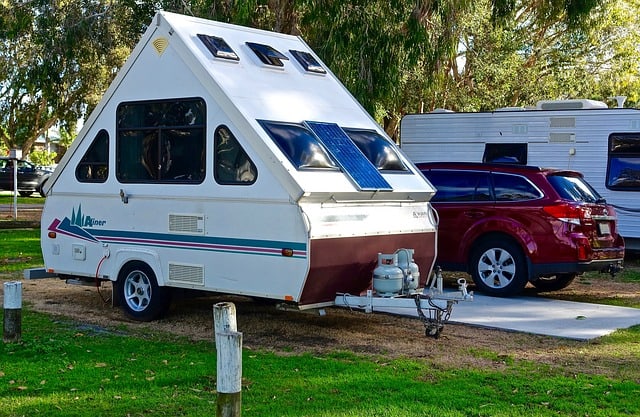
RV Park Pros
- Full or partial RV hookups.
- Amenities such as pools, laundry facilities, free wi-fi, and playgrounds.
- Actively managed and someone available to handle issues and problems.
- Enhanced safety thanks to common safety measures such as 24-hour security, fenced perimeters, security gate, and cameras.
RV Park Cons
- Can be expensive as RV parks usually cost between $30 and $50 a night, however, some RV parks due offer long-term or monthly rates that are cheaper.
- Can be noisy and crowded.
- Sites are very close together.
- Very little nature or wildlife (unless you’re staying in a National or State Park).
Boondocking
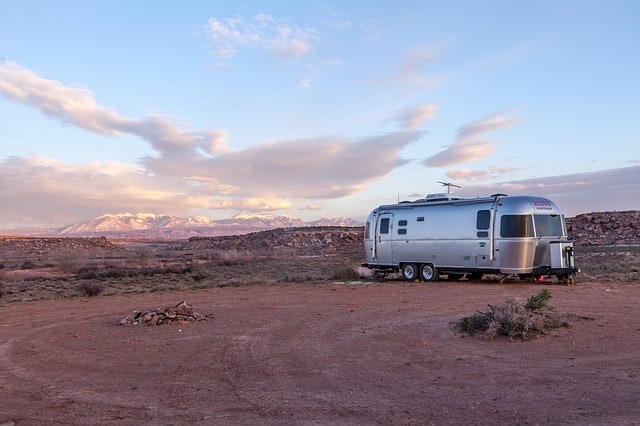
Boondocking Pros
- While boondocking you usually stay on government lands such as National Forest land or BLM land which is completely free to stay on.
- Surrounded by nature.
- Less noise and crowds.
- Offers a lot more privacy.
Boondocking Cons
- No RV hookups.
- Will offer very few if any amenities, however, you can sometimes find vault toilets or a communal water source.
- Cell phone signals are hard to come by and can be very limited.
- Because boondocking involves remote camping, help can be much farther away and harder to reach in case of an emergency.
- Most boondocking or dispersed camping locations have a limit of 14 days before you have to move.
Recent Posts
47 RV Storage Ideas to Maximize Your Space for Compact Living
Camping and living in an RV is an incredible adventure, but it comes with its fair share of challenges, particularly around storage, due to the lack of space. Because of this, it's a must to make...
Are you looking to give your RV a cozy, rustic makeover? If so, farmhouse RV decor is the perfect style to transform your camper into a warm and inviting home on wheels. In this blog post, I'll...
